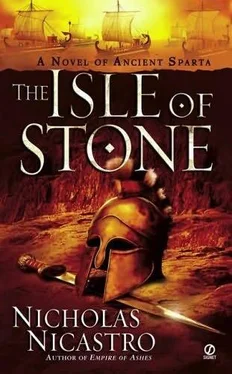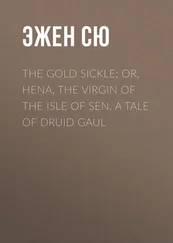Nicholas Nicastro - The Isle of Stone
Здесь есть возможность читать онлайн «Nicholas Nicastro - The Isle of Stone» весь текст электронной книги совершенно бесплатно (целиком полную версию без сокращений). В некоторых случаях можно слушать аудио, скачать через торрент в формате fb2 и присутствует краткое содержание. Жанр: Исторические приключения, на английском языке. Описание произведения, (предисловие) а так же отзывы посетителей доступны на портале библиотеки ЛибКат.
- Название:The Isle of Stone
- Автор:
- Жанр:
- Год:неизвестен
- ISBN:нет данных
- Рейтинг книги:4 / 5. Голосов: 1
-
Избранное:Добавить в избранное
- Отзывы:
-
Ваша оценка:
- 80
- 1
- 2
- 3
- 4
- 5
The Isle of Stone: краткое содержание, описание и аннотация
Предлагаем к чтению аннотацию, описание, краткое содержание или предисловие (зависит от того, что написал сам автор книги «The Isle of Stone»). Если вы не нашли необходимую информацию о книге — напишите в комментариях, мы постараемся отыскать её.
The Isle of Stone — читать онлайн бесплатно полную книгу (весь текст) целиком
Ниже представлен текст книги, разбитый по страницам. Система сохранения места последней прочитанной страницы, позволяет с удобством читать онлайн бесплатно книгу «The Isle of Stone», без необходимости каждый раз заново искать на чём Вы остановились. Поставьте закладку, и сможете в любой момент перейти на страницу, на которой закончили чтение.
Интервал:
Закладка:
When they were released, no one came from Laconia to escort the prisoners back home. This worried the under-thirties, who hoped that the ephors would understand that they surrendered on orders of their superiors. The Spartiates knew better-Frog, who wore his shame lightly, absorbed himself in organizing the march, refusing to speculate on what reception they should expect. Antalcidas, for his part, envied Epitadas for his honorable exit. He could count on one hand his reasons for not following his brother: namely, his wife, his son, settling accounts with Frog. The latter concerned him most the day they set out on the road home.
There was unease in the ranks when Antalcidas did not join his countrymen for the march. As they proceeded along the Eleusis road, suspicion rose that they were being tracked by something as invisible as the wind and unavoidable as night. “The Athenians are betraying the treaty,” Frog declared, but no one believed him. For what was on their trail was nothing as clumsy as an Athenian. Instead, the Lacedaemonians had the strange sense of being like helots under observation by an operative of the Hidden Service.
The air of doom seemed to gather and congeal around Frog; the under-thirties, without knowing why, moved away from him. Despite their night training, the tension over what followed them made the Lacedaemonians afraid of the dark. Frog took to sleeping in trees with a heavy rock. If what trailed him had a name, he would have guessed it was “Antalcidas,” but in a broader sense the specific adversary didn’t matter. Too many of his comrades wanted him dead for the decision he had so loudly owned for himself, in front of witnesses. When someone suggested he rush ahead to procure a sword at Megara, Frog scoffed, saying, “No Megarian sword should keep a man from his Fate, if he chooses to face it.”
They found him the next day at the foot of his tree. His throat had been slit with a very short blade, perhaps even a sharpened stone; his tongue was cut out and, by evidence of the wet spot nearby, was left in the dirt. The crows had claimed their gift before the body was found. Frog could only have been dead for a few hours, but his corpse was swollen, the face chalky, as if he had been rotting for much longer.
Antalcidas proceeded south. The upheavals of the war had disrupted wagon traffic, leaving most of the roads unrutted but trampled by the prints of thousands of bare marching feet. Though he had traversed the mountains into the Peloponnese many times, it had always been in the company of an army. Now, as a lone traveler, he saw the road stretch thin and insubstantial through those spaces, and the sound his breathing something small and absurd in the enormity of silence around him. It was as if the gods had exhausted their palettes in rendering the fuller, more frivolous landscapes of other lands, and for Greece been forced to make the most with pure black, the green of ripening olives, and earth. He saw the blankness in his own shadow-a shadow that was uncompromising, sharing not a shred of gray with him.
Outside Nemea he stopped at a farmhouse for water. The master, who regarded him narrowly from under thick, tufted brows, seemed to recognize him as a Lacedaemonian. When Antalcidas asked for a drink, the Nemean accompanied him to the wellhead, going on about the “peace of Nicias.” His real purpose, though, was to ask a question: how could it be that the Spartans had given up at Sphacteria?
“That must be old news by now, friend,” Antalcidas replied. “That was years ago.”
“It was, but you’re the first Lacedaemonian we’ve seen this far north since word came. I’m hoping you can explain it.”
Antalicidas drank; out of the corner of his eye, on the ground, he could see the shadow of the farmer’s wife as she listened from around the corner. He drained the cup, handed it back to the Nemean, and took up his staff to resume his trip.
“Some answers are not worth the effort of asking,” he said.
Two days later he topped the pass through Sciritis and gazed down into the haze-dressed valley of Laconia. Despite what his intellect told him to expect, he found his breath quickening at the prospect of arrival. In Athens, he had spent much of his time alone, yet had always felt the energy of the place-a low rumble, like the pulse of the earth-rising up from the pavement stones. Near Corinth, he looked up and saw the tentacles of commerce, eternal and lucrative, reach up the acropolis to wrestle with the thousand sacred courtesans who served Aphrodite there. As he passed to the west, he could turn back at night and trace the path by the procession of customers’ torches snaking up the illuminated citadel.
But in Laconia all was quiet. Crossing the Eurotas bridge, he came to the first of her five villages, Limnae, and found it little more impressive than a hundred country hamlets he had seen on the road. It was midmorning, and the household helots were out doing the marketing for their masters. None of these met his eyes as they passed; nor was he acknowledged by the knots of schoolgirls on their way to lessons.
Sparta was small enough, though, that one would always recognize someone within a few moments of going out on the street. No sooner had this thought entered his mind than he saw a familiar face. It was, in fact, someone from his deep past, whom he had not encountered in all the years since his childhood. Antalcidas, walking by the man, raised a chin to a man with a conspicuous mole on his right cheek.
“Rejoice!” he hailed the former packmate he once knew as Birthmark.
Antalcidas was arrested by a series of expressions that came over the other’s face. First there was surprise-an involuntary widening of the eyes and mouth, a hint of amusement at the pranks of Fortune. Second came the imposition of a memory: Birthmark seemed suddenly afflicted, his legs unable to slow the pace that carried him onward. Finally, there was disapproval: a sanctimonious darkening around the eyes, and a deliberate speeding of his step as he completed the act of ignoring the comrade who had greeted him.
Antalcidas found himself walking stiffly onward, bewildered. Certainly Birthmark had recognized him-nobody forgot the faces of those with whom he had shared the Rearing. Such things always transcended circumstances that might take a man up or down in the esteem of everyone else. If Birthmark had been declared a trembler, Antalcidas would still have greeted him, perhaps even shared a drink with him. And he thought: how cold the Lacedaemonians had become, how petty in their resentments!
This thought put him in mind of his dear Andreia, who once told him that, of all the Greeks, the Spartans had the broadest territory and the narrowest hearts. Remembering her, a smile came over him as he redoubled his pace toward the little house in Kynosoura. The son of Antalcidas grows. It occurred to him that the boy must be walking by then, and learning the songs of his ancestors. If he hurried, he might yet be first to put a sword in the hands of his son.
9
He didn’t have to wait long to see Andreia. As he came up the path she was bent to her garden work, picking herbs for the kitchen. Hearing him, she stopped, straightened; when she turned to look over her shoulder at him there was no reaction on her face. The smile died on Antalcidas’ lips. He was reminded suddenly of a feeling he’d had on a patrol high in the mountains of Arcadia, when the snows finally broke in late spring. Standing below, he was sure the avalanche would bury them, until the streaming white comet was diverted into some hidden ravine, and he and his men stood alone, abandoned by death. Andreia, too, turned aside. Yet the wall of her frigidity still bore down on him.
In his prison days he had spent much of his time daydreaming of her. He imagined the time of their separation-and her latest pregnancy-would have changed her, and occupied himself with imagining her appearance on the day of their reunion. As she conducted him inside wordlessly, he saw that his fantasies had failed him: Andreia’s figure had not become plumper with home comforts, nor her hair grayer, nor her cheeks more deeply lined with age. Instead of matured, she was simply diminished, as if worn down by the years. He remembered her standing nearly his equal in height, and was surprised to find that her head barely rose to his shoulders. Instead of gaining weight, she was thinner. Through the ungirt side of her chiton he could the blade of her hip protruding, the white of the bone almost visible beneath the taut translucence of her skin. Her hair had neither the luminance of her youth, nor the gray tendrils of age, but had become only darker, flatter, duller.
Читать дальшеИнтервал:
Закладка:
Похожие книги на «The Isle of Stone»
Представляем Вашему вниманию похожие книги на «The Isle of Stone» списком для выбора. Мы отобрали схожую по названию и смыслу литературу в надежде предоставить читателям больше вариантов отыскать новые, интересные, ещё непрочитанные произведения.
Обсуждение, отзывы о книге «The Isle of Stone» и просто собственные мнения читателей. Оставьте ваши комментарии, напишите, что Вы думаете о произведении, его смысле или главных героях. Укажите что конкретно понравилось, а что нет, и почему Вы так считаете.










![Nicholas Timmins - The Five Giants [New Edition] - A Biography of the Welfare State](/books/701739/nicholas-timmins-the-five-giants-new-edition-a-thumb.webp)

